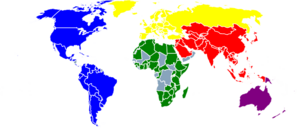Badminton World Federation facts for kids
 |
|
| Abbreviation | BWF |
|---|---|
| Formation | 5 July 1934 |
| Founded at | Cheltenham, England |
| Type | Sports federation |
| Headquarters | Kuala Lumpur, Malaysia |
|
Membership
|
202 member associations |
|
President
|
Khunying Patama Leeswadtrakul |
|
Revenue (2023)
|
US$6.9 million |
| Expenses (2019) | US$28.27 million |
The Badminton World Federation, also known as BWF, is the main organization that runs the sport of badminton around the world. It's approved by the International Olympic Committee, which means it helps make sure badminton is played fairly and well.
The BWF started on July 5, 1934. Back then, it was called the International Badminton Federation (IBF). Nine countries were part of it at the beginning: Canada, Denmark, England, France, Ireland, Netherlands, New Zealand, Scotland, and Wales. Later, in 1981, the IBF joined with another group called the World Badminton Federation. Then, on September 24, 2006, the organization changed its name to the Badminton World Federation.
When the BWF first started, its main office was in Cheltenham, UK. But on October 1, 2005, it moved to Kuala Lumpur, Malaysia. The current president of the BWF is Khunying Patama Leeswadtrakul from Thailand. The BWF has 202 member countries and regions all over the world. These members are grouped into five larger continental organizations.
Contents
How Badminton is Organized Globally
The BWF works closely with five regional groups to help badminton grow and develop everywhere. These groups manage the sport in different parts of the world:
| Region | Organization | Members | |
|---|---|---|---|
| Asia | Badminton Asia (BA) | 45 | |
| Europe | Badminton Europe (BE) | 53 | |
| Americas | Badminton Pan America (BPA) | 38 | |
| Africa | Badminton Africa | 49 | |
| Oceania | Badminton Oceania (BO) | 17 | |
| Total | 202 | ||
Leaders of the BWF
Here is a list of the presidents who have led the BWF (and its earlier name, IBF) since it began in 1934:
| No. | Years | Name | Country |
|---|---|---|---|
| 1 | 1934–1955 | George Alan Thomas | |
| 2 | 1955–1957 | John Plunkett-Dillon | |
| 3 | 1957–1959 | Brigadier Bruce Hay | |
| 4 | 1959–1961 | A. C. J. van Vossen | |
| 5 | 1961–1963 | John McCallum | |
| 6 | 1963–1965 | Nils Peder Kristensen | |
| 7 | 1965–1969 | David Bloomer | |
| 8 | 1969–1971 | Humphrey Chilton | |
| 9 | 1971–1974 | Ferry Sonneville | |
| 10 | 1974–1976 | Stuart Wyatt | |
| 11 | 1976–1981 | Stellan Mohlin | |
| 12 | 1981–1984 | Craig Reedie | |
| 13 | 1984–1986 | Poul-Erik Nielsen | |
| 14 | 1986–1990 | Ian Palmer | |
| 15 | 1990–1993 | Arthur Jones | |
| 16 | 1993–2001 | Lu Shengrong | |
| 17 | 2001–2005 | Korn Dabbaransi | |
| 18 | 2005–2013 | Kang Young-Joong | |
| 19 | 2013–2025 | Poul-Erik Høyer Larsen | |
| 20 | 2025– | Patama Leeswadtrakul |
Player Rankings
The BWF has a special system to rank badminton players. This system helps figure out how strong players are. It's used to decide who can enter BWF tournaments and how players are seeded (which means their starting position in a competition).
Players earn points based on how well they do in tournaments over the past 52 weeks. There's also a BWF World Junior Ranking for players who are under 19 years old.
Badminton Tournaments
The BWF organizes many exciting badminton tournaments around the world. These events bring together the best players from different countries.
Major Global Events (Grade 1)
The BWF regularly holds seven big international badminton events. They also have two events for para-badminton, which is badminton for athletes with disabilities.
- Major Tournaments:*
- BWF World Championships: This is where the world's best players compete to be champions.
- Thomas Cup: A team competition for men.
- Uber Cup: A team competition for women.
- Sudirman Cup: A mixed team competition, where men and women play together.
- Olympic Games: Badminton is a sport at the Olympics, and the BWF works with the International Olympic Committee for this.
- Other Important Tournaments:*
- BWF World Junior Championships: For young, rising badminton stars.
- BWF World Senior Championships: For older players who still love to compete.
- Para-Badminton Major Tournaments:*
- BWF Para-Badminton World Championships: The top competition for para-badminton players.
- Paralympic Games: Para-badminton became a sport at the Paralympics starting with the Tokyo 2020 Games. The BWF works with the International Paralympic Committee for this.
- Past Major Event:*
- The Badminton World Cup was a big event that stopped being held regularly after 1997. It was brought back in 2005 as a special invitational tournament, where China won all five categories.
BWF World Tour (Grade 2)
The BWF World Tour is a series of tournaments with different levels. Players earn different amounts of world ranking points depending on the level of the tournament. The levels are:
- Level 1: BWF World Tour Finals
- Level 2: BWF World Tour Super 1000
- Level 3: BWF World Tour Super 750
- Level 4: BWF World Tour Super 500
- Level 5: BWF World Tour Super 300
- Level 6: BWF Tour Super 100
Some events that were part of the tour from 2007 to 2017 included:
- Super Series Premier
- Super Series
- Grand Prix Gold
- Grand Prix
Continental Circuit (Grade 3)
These tournaments are organized by the continental federations and also give world ranking points. They are divided into three levels:
- BWF International Challenge
- BWF International Series
- BWF Future Series
Awards and Honors
The BWF gives out special awards to players, referees, sponsors, and other people. These awards recognize their great achievements in badminton or their important help to the sport. Some of these awards include:
- Lifetime Achievement
- Hall of Fame
- Herbert Scheele Trophy
- Distinguished Service
- Meritorious Service
- Certificate of Commendation
- BWF Awards, which include:
- Best Male and Female Player of the Year
- Most Promising Player of the Year
BWF Logos
The BWF has changed its logo a few times over the years. When it was the IBF, it used that logo. After changing to BWF, a new logo was adopted in 2007. In 2012, they introduced a new, more modern logo.
Clothing Rules
In 2011, the BWF introduced a rule about what women badminton players should wear during matches. The rule suggested that women should wear dresses or skirts. However, this rule was later dropped before it was supposed to start in 2012.
See also
 In Spanish: Federación Mundial de Bádminton para niños
In Spanish: Federación Mundial de Bádminton para niños
- BWF World Ranking
- World Badminton Federation (This organization merged with the IBF in 1981)
 | Victor J. Glover |
 | Yvonne Cagle |
 | Jeanette Epps |
 | Bernard A. Harris Jr. |



